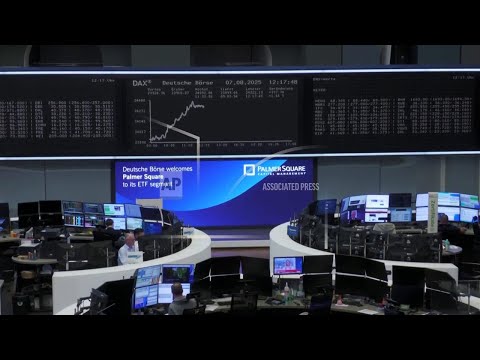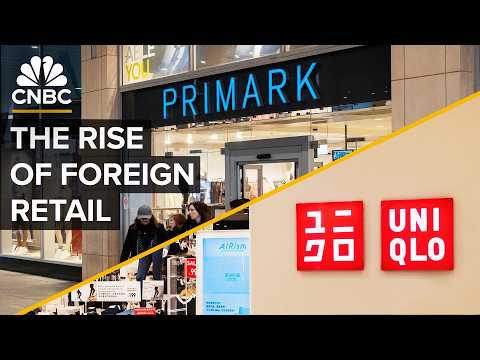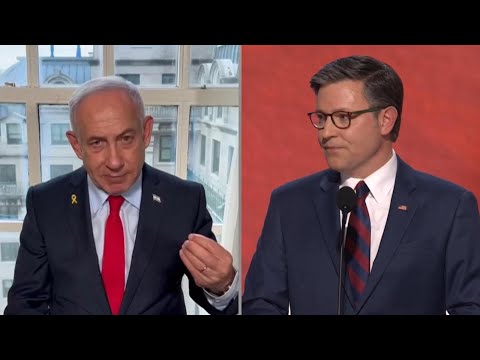(7 Aug 2025)
RESTRICTION SUMMARY
ASSOCIATED PRESS
Frankfurt, Germany – 7 August 2025
1. Wide of Frankfurt Stock Exchange trading floor
2. Mid of traders
3. Close of display showing stock market performance
4. Robert Halver walking
5. SOUNDBITE (German) Robert Halver, Head of Capital Market Analysis at Baader Bank:
"There’s no question about it, this hurts. We pay 15% customs duties. Before, we paid just under 2%. That will definitely reduce our profits. It hurts like hell, but we have one advantage: we have more planning security. Before, we had 30%, but still, you have to say it’s very selfish of the U.S. president, because America pays virtually no customs duties in return."
6. Wide of stock exchange trading floor
7. SOUNDBITE (German) Robert Halver, Head of Capital Market Analysis at Baader Bank:
“And another issue, another obstacle, is of course the investment of several hundred billion dollars in the U.S. The EU cannot determine that. Individual companies have to do that. And so Trump still has plenty of grounds for telling us that we haven’t kept to the deal and that he wants even higher tariffs.”
8. Mid of traders
9. Wide of stock exchange trading floor
10. SOUNDBITE (German) Robert Halver, Head of Capital Market Analysis at Baader Bank:
"Negotiations will continue, that much is clear, because the German government and the EU will also try to simplify this trade deal and change it to our advantage, but that will be difficult. Trump is a tough nut to crack, and although we now have a deal, at least on the surface, without having specified it in detail, it must also be clear that the cat won’t give up the mouse. If there’s anything Mr. Trump doesn’t like, he’ll threaten the EU with higher tariffs again."
11. Wide of trading floor
12. Close of display showing stock market performance
13. SOUNDBITE (German) Robert Halver, Head of Capital Market Analysis at Baader Bank:
“Industrial sites in Europe are being weakened. One must clearly acknowledge that higher tariffs on imports from America add another handicap to the planning uncertainty, the energy supply, which is far too expensive, the high taxes, and the high social security contributions. This means that industrial locations will fall even further behind, unless the EU and Germany are finally prepared to implement tough economic reforms. But what we are hearing from the federal government does not exactly fill me with optimism."
14. Mid of trader
15. Wide of trading floor
STORYLINE:
U.S. President Donald Trump began levying higher import taxes on dozens of countries Thursday, just as the economic fallout of his monthslong tariff threats has begun to create visible damage for the U.S. economy.
Just after midnight, goods from more than 60 countries and the European Union became subject to tariff rates of 10% or higher.
Products from the EU, Japan and South Korea are taxed at 15%, while imports from Taiwan, Vietnam and Bangladesh are taxed at 20%.
Trump also expects the EU, Japan and South Korea to invest hundreds of billions of dollars in the U.S.
"There’s no question about it, this hurts,” said Robert Halver, Head of Capital Market Analysis at Germany’s Baader Bank.
“We pay 15% customs duties. Before, we paid just under 2%. That will definitely reduce our profits. It hurts like hell, but we have one advantage: we have more planning security.”
Despite the uncertainty, the Trump White House is confident that the onset of his broad tariffs will provide clarity about the path of the world’s largest economy.
Total construction spending has dropped 2.9% over the past year.
Find out more about AP Archive: http://www.aparchive.com/HowWeWork
Twitter: https://twitter.com/AP_Archive
Facebook: https://www.facebook.com/APArchives
Instagram: https://www.instagram.com/APNews/
You can license this story through AP Archive: http://www.aparchive.com/metadata/youtube/54a8ee9e09b2433593f653a6b09cb6ef
Author: AP Archive
Go to Source
News post in August 12, 2025, 12:05 pm.
Visit Our Sponsor’s:
News Post In – News





